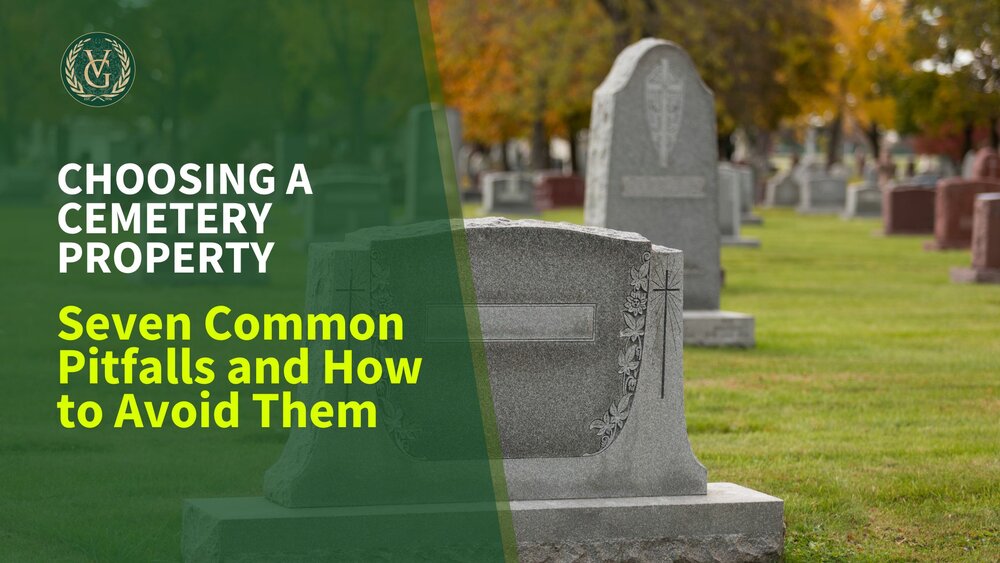Seven Common Pitfalls When Choosing a Cemetery Property and How to Avoid Them
Choosing a cemetery property is a deeply personal decision that requires careful consideration of emotional and practical factors.
When faced with the task of selecting a final resting place, it's essential to weigh the key aspects to ensure the choice aligns with your needs and values. This article will guide you through seven crucial considerations when choosing a cemetery property so you can make a well-informed decision that honors your loved one and provides lasting peace of mind.
1. Buying a plot sight unseen.
While researching the cemeteries in your area, you might see one that looks ideal on its website. You love everything about it and decide to purchase a plot there. Beware: this could be a huge mistake. Purchasing a cemetery plot without seeing it in person is risky. The website may present the grounds in their best light, but the actual condition might be quite different. You might encounter poorly maintained gravestones, unkempt bushes, or other issues that weren't apparent online. Make sure to visit the cemetery before finalizing your purchase to ensure that it meets your expectations and is as well-kept in reality as it appears virtually.
2. Not considering future needs.
Because loss is often sudden, unexpected and filled with emotion, people often focus solely on immediate funeral needs without thinking about future requirements. That holds true for burial plots, too. As you search for a resting place for the departed, think about your future needs. For example, you may wish to buy a series of burial plots for other family members, too. Be sure to take into account important factors such as additional space that may be required and the cost of associated maintenance.
3. Failing to think about the location.
Choosing a cemetery without giving careful consideration to its location can be problematic. The location of the gravesite is an important factor for a number of reasons. Trees, open space, landscaping, hills, or flat ground all contribute to the ambiance and accessibility of the final burial spot. Think about which family members are likely to visit and if the location is geographically convenient for them. In some cases, the burial plot will be in the precise location you selected, while in other cases, the exact brutal plot location will be determined by availability. Be sure to get a clear understanding of what you are purchasing and where it is situated.
4. Ignoring cemetery rules and regulations.
Each cemetery has its own rules regarding headstones, markers, and decorations. Not being aware of these can lead to unexpected issues later on. Once you know the type of cemetery you are seeking, you can then determine if their rules align with your vision for the burial site. For example, if having a headstone is important to you, you might skip a cemetery that only allows grave markers. Some cemeteries allow artificial flowers, while others do not. If you have opted for cremation, there will also be rules about how the cremains can be distributed and stored. The type of cemetery you select will be determined by personal preference and the local laws. Be sure to get a clear picture of these details before making a purchase.
5. Forgetting to compare costs.
Cemetery pricing can vary significantly based on location, amenities, and services provided. Some cemeteries may charge premium prices due to their amenities, upkeep, location, or prestige, while others that offer more economical options that may suit your needs just as well. It's crucial to explore several cemeteries and compare their costs before making a decision. Avoid the mistake of settling for the first place you come across.
6. Overlooking burial options.
Cemeteries offer a range of burial options, each with unique features and benefits. Choices may include traditional ground burials, which involve interring the body in a cemetery plot; green burials, which focus on environmentally friendly practices; mausoleums, which provide above-ground entombment; or cremation niches, which offer a space for storing cremated remains. Consider and choose the option that aligns with your loved one’s personal, cultural, or family preferences.
7. Not checking the cemetery’s reputation.
Researching the cemetery through online reviews, testimonials, and feedback from previous clients can provide valuable insights into the quality of their services and the condition of the property. A cemetery with a solid reputation will likely offer better service, well-maintained grounds, and a supportive staff. It’s also wise to investigate the cemetery’s history and stability to ensure it is well-established and unlikely to face financial or operational issues that could affect the care of the property. Thorough research helps avoid potential problems and ensures that the final resting place will be handled with respect and professionalism.
Planning the funeral and burial for a loved one requires many difficult decisions. We hope this guide to choosing a cemetery property will help you avoid missteps and make the process easier. If you need additional assistance or have questions, please feel free to reach out to us anytime.
About Vaughn Greene Funeral Services: For more than 25 years, Vaughn Greene Funeral Services has been providing a ministry of care to Baltimore’s African American community. As a leading local, minority- and family-owned provider, we promise to provide our highest level of service and respect to families who entrust us to honor their loved ones. For more information about our funeral, cremation, memorial, repast, and grief counseling services, please call us at 410.655.0015 or visit us online at https://vaughncgreene.com/.











Comments